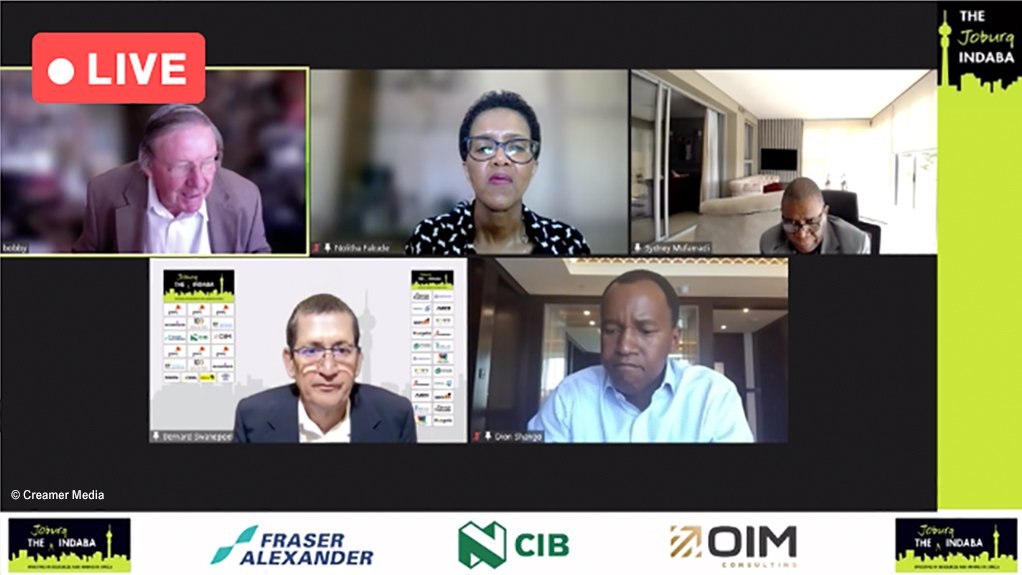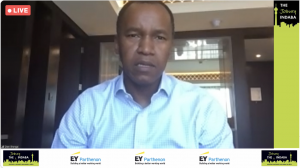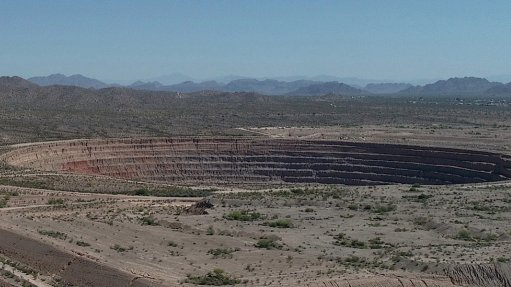South Africa in danger of missing out on commodity boom, Joburg Indaba hears


Joburg Indaba opening session covered by Mining Weekly’s Martin Creamer. Video: Darlene Creamer
Presenting at Joburg Indaba are (from top left, clockwise) Bobby Godsell, Nolitha Fakude, Sydney Mufamadi, Dion Shango and Bernard Swanepoel.
Photo by Creamer Media
JOHANNESBURG (miningweekly.com) – A much more enabling environment is needed to ensure that South Africa does not miss out on yet another commodity boom, the Joburg Indaba heard on Wednesday.
“We know that we’ve missed at least one commodity boom,” Foskor chairperson, Industrial Development Corporation director and founding AngloGold Ashanti CEO Bobby Godsell recalled during the opening session of the ninth Joburg Indaba covered by Mining Weekly. (Also wach attached Creamer Media video.)
“We should be poised to fully take advantage of a boom now. We’ve got to be candid and honest that mineral deposits deplete over time… but beyond what geology does to us, what have we done to ourselves?” Godsell asked his panel made up of PwC Africa CEO Dion Shango, Minerals Council South Africa president Nolitha Fakude and Impala Platinum independent nonexecutive director and former Cabinet Minister Dr Sydney Mufamadi, during the 700-audience online event, chaired by mining stalwart Bernard Swanepoel.
“Are we going to miss this next boom? There’s a serious demand-led commodity boom. We’re a supplier. Are we going to miss it?” Swanepoel reiterated, in directing his question to Shango, whose PwC this week stated in its thirteenth edition of 'SA Mine 2021' that the extent to which South Africa could benefit from the current demand growth was dependent on the country’s ability to address bottlenecks in supply.
“Certainly for me, it depends on the degree to which mining, as an industry, can make tangible progress in building better trust with government,” said Shango.
“Bobby referenced earlier that we have missed booms before, so it is not impossible. But certainly, building better trust with government should result in a more amenable policy setting – and a much more enabling environment will be critical, in order for us to not miss that boom. For me, that is what lies at the heart of it,” added Shango.
Mufamadi, who was South Africa’s Minister of Safety and Security from 1994 to 1999 and Minister of Provincial and Local Government from 1999 to 2008, commented that it was the responsibility of the mining industry to engage government “to facilitate each other to a higher level of understanding of the challenges that we face as a country. We should not throw in the towel. We have to invest in serious engagement".
Mufamadi, who is also chairperson of the Zimplats platinum operation in Zimbabwe, revealed how Zimplats had been in discussion with the government of Zimbabwe, in part to present some growth ambitions.
“Without having to strain to convince them about their need to relook the incentives currently in place, the Zimbabwe government itself started saying that it wanted to incentivise our growth ambitions, because it could see the contribution that they would make to the Zimbabwe economy.
“Unprompted, they really started coming up with ideas that improved incentives, not only for us but for industry-wide application. It is our responsibility to engage government,” Mufamadi reiterated.
Fakude outlined four issues that had probably prevented the South African mining industry from being able to unlock the huge opportunity that comes from mining being an economic catalyst.
The first is the need for infrastructure such as railways, roads and ports being up to scratch to ensure that the mining industry can get its goods to market.
The second is the slowing down of exploration to unlock the trillion dollars worth of resources locked in the ground.
The third is regulatory delay, which slows down the rate of investment, and the fourth is the perception that South Africa’s regulatory framework is unpredictable.
Article Enquiry
Email Article
Save Article
Feedback
To advertise email advertising@creamermedia.co.za or click here
Press Office
Announcements
What's On
Subscribe to improve your user experience...
Option 1 (equivalent of R125 a month):
Receive a weekly copy of Creamer Media's Engineering News & Mining Weekly magazine
(print copy for those in South Africa and e-magazine for those outside of South Africa)
Receive daily email newsletters
Access to full search results
Access archive of magazine back copies
Access to Projects in Progress
Access to ONE Research Report of your choice in PDF format
Option 2 (equivalent of R375 a month):
All benefits from Option 1
PLUS
Access to Creamer Media's Research Channel Africa for ALL Research Reports, in PDF format, on various industrial and mining sectors
including Electricity; Water; Energy Transition; Hydrogen; Roads, Rail and Ports; Coal; Gold; Platinum; Battery Metals; etc.
Already a subscriber?
Forgotten your password?
Receive weekly copy of Creamer Media's Engineering News & Mining Weekly magazine (print copy for those in South Africa and e-magazine for those outside of South Africa)
➕
Recieve daily email newsletters
➕
Access to full search results
➕
Access archive of magazine back copies
➕
Access to Projects in Progress
➕
Access to ONE Research Report of your choice in PDF format
RESEARCH CHANNEL AFRICA
R4500 (equivalent of R375 a month)
SUBSCRIBEAll benefits from Option 1
➕
Access to Creamer Media's Research Channel Africa for ALL Research Reports on various industrial and mining sectors, in PDF format, including on:
Electricity
➕
Water
➕
Energy Transition
➕
Hydrogen
➕
Roads, Rail and Ports
➕
Coal
➕
Gold
➕
Platinum
➕
Battery Metals
➕
etc.
Receive all benefits from Option 1 or Option 2 delivered to numerous people at your company
➕
Multiple User names and Passwords for simultaneous log-ins
➕
Intranet integration access to all in your organisation




















